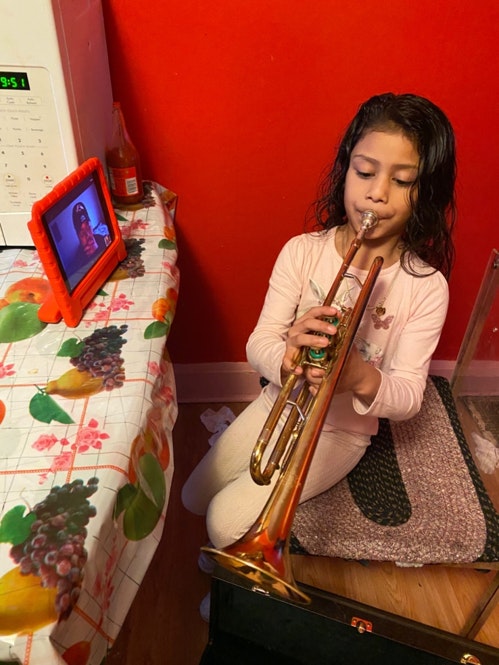How 100 hotspots will keep the music playing across Baltimore
"The ability to stay connected to each other is so critical right now."

Baltimore, Maryland (February 23, 2021) – Teaching math or reading through a virtual classroom is no small feat but imagine how difficult teaching a child to play an instrument would be.
“It’s extremely challenging if someone doesn’t have a good camera or strong internet connection,” said Raquel Whiting Gilmer, Executive Director, OrchKids. “Your teacher needs the camera just to see how you’re holding your instrument or using your fingers. Also, having a high-quality internet connection has an impact on our instruction because we need to hear the sound to make sure you’re hitting the right notes.”
OrchKids is, a music program “designed to create social change and nurture promising futures” for youth in Baltimore City neighborhoods.
“We are very embedded in and trusted by the communities we serve and because of this, we hear and see many of the needs of our families—not just their musical learning needs,” Gilmer said.
That includes challenges students may have at home, whether it’s food insecurity, housing instability or lack of access to technology. So, at the onset of the pandemic, OrchKids immediately started surveying families to identify their specific needs and technology access while training teachers and students to use new, online platforms.

“Once we moved our entire operations online (within 10 days of the state’s school closure announcement), we started hearing that students couldn’t attend their lessons regularly because they couldn’t access a stable internet connection,” said April Dodge, Director of Development, OrchKids. “We also learned that some students could only access programming using their parent’s or guardian’s smart phone, and if that adult is working during the day, the kids couldn’t attend their classes at school or take part in their music lessons.”
In response, the organization invested operating dollars in Chromebooks to loan students who did not have a dedicated learning device and, later, applied to the AT&T K-12 homework gap program, which is providing free wireless internet access and mobile Wi-Fi hotspots to at-risk students across the country. OrchKids was awarded 100 hotspots to help meet the needs of the kids they help.
“This program does so much in the community and connects with kids by supporting them and nurturing their growth and well-being,” said Brent Legg, Executive Vice President of Government Affairs, Connected Nation (CN).
“Our team was so impressed with how OrchKids also tackles the environmental and social trauma many of these children have endured—allowing kids space to move past their difficult experiences and learn to express themselves and flourish through music.”
Connected Nation, a national nonprofit working toward expanding broadband (high-speed internet) access, adoption, and use to ALL families, is overseeing the homework gap program—which is made possible by a $10 million funding commitment from AT&T.
“The ability to stay connected to each other is so critical right now,” said Gilmer. “We have seen firsthand the negative impact that isolation is having on our students and families. To have these hotspots and this reliable access to the internet means our students can connect with us and with each other. It helps and it matters.
"Even just today I heard that one of our fourth-grade students who lives with his grandmother and earned honor roll last year hasn’t been able to log into his school classes for the past three weeks due to internet issues. This grant will change that for Ta’Kai and his grandmother. We are so grateful!”

The AT&T K-12 homework gap program, which closed its application portal Jan. 11, is focused on impacting under-resourced students with an emphasis on helping some of the most vulnerable students in the country—including students with disabilities, students in foster care, students experiencing homelessness, English language learners, and others.
There are 124 awardees in the program that span 26 states—representing 81 school districts and 43 nonprofits. In total, 35,000 hotspots will be given to program that help at-risk students across the country.
Even when the pandemic finally ends, OrchKids leaders say they will use the hotspots and internet services to keep connecting with kids across Baltimore communities.
“Last year, our students started making music together online, our entire summer program was online,” said Gilmer. “The need is not going away anytime soon. We believe this will help us to further support students in a virtual manner—through private lessons or, particularly with our older students, if they have commitments that keep them away from their OrchKids lessons like jobs or family needs, access to high-quality internet will allow them to stay connected and keep them engaged and playing music.”
Learn more about OrchKids: http://orchkids.org/ #OrchKidsplayson






